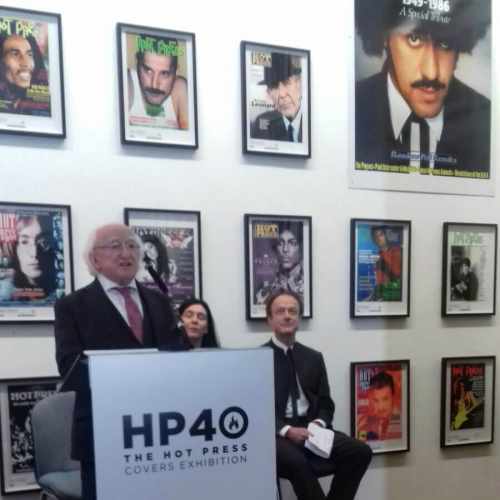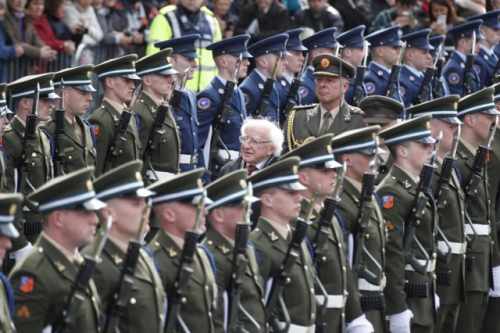Speech at the official opening of the O’Donoghue Centre for Drama, Theatre and Performance
NUI Galway, 10 April 2017
Dear Friends
I was delighted to receive the invitation to officially open The O’Donoghue Centre for Drama, Theatre and Performance. This new centre is, of course, named in recognition of the patronage of Dr. Donagh O’Donoghue who, while he has contributed so much to Galway’s economic and cultural life has, in particular, been a constant source of advice to NUIG and to NUIG’s administration. He has been involved in the expansion in every area. Donagh, Marcia and I, we all started as students in UCG in the same year, taking practically the same subjects, but more importantly we shared an interest in the same society be it the Arts Society, the Debating Societies and in particular, DramSoc.
The year we came was 1962 and in that year UCG’s DramSoc had produced Henrik Ibsen’s ‘Brand’ under the direction of the brilliant Frank Bailey, who would be taken from us too soon. Donagh’s interest in DramSoc was thus an early one and would lead to his pioneering and enduring support for Druid.
Is ócáid mhór í oscailt Ionad Uí Dhonnchadha i saol Ollscoil na hÉireann i nGaillimh, agus sa saol chultúrtha a bhaineann leis a healaíon traidisiúnta ach go háirithe.
[The opening of the new O’Donoghue Centre is an important landmark in the life of NUI in Galway, and in particular its proud and impressive tradition in the arts.]
This centre will become, I hope, a dedicated home for, not only the University’s many new academic programmes in theatre, performance and music, but will also facilitate the recovery of new productions of the classical and European repertoire in theatre, and by the production of such international works, can greatly enhance the artistic and cultural dimension of our society. Those who will work here will gain from both the legacy and the possibilities of new work that is fostered with new and exciting talent.
Only some of us present will remember what was here before. The re-imagining of what was once an early 19th century bleach and flax mill into a cultural space comprising a 120-seat auditorium, rehearsal rooms and many ancillary facilities exemplifies so much of the contemporary spirit of this university; NUI Galway’s real will to promote and encourage an environment of creativity.
‘Creativity’ is a word in great danger of misuse, like so many other words that have come into current usage. Creativity properly understood requires a commitment to work, scholarship, authenticity, and an integrity that makes a real demand on its user, that is if the word is not to be reduced to the rhetorical, or even become an advertising slogan.
It is important that our Universities retain a capacity to hold unique characteristics and to value them as they achieve excellence, accepting the responsibility of enabling and empowering citizens to participate fully and effectively at all levels of society. It was, after all, through the demand for creative and free thinking that our universities acquired their status in the past and that creative function with its scholarship, is essential for original thought, and should be cherished and encouraged.
NUI Galway has played a key role in helping to establish Galway’s reputation as a city that is perceived now as valuing culture and cultural expression. Galway, through the Trojan contributions of its artists, artists such as those that make up the Druid Company, enjoys a reputation as an international centre for innovative drama, theatre and performance.
Galway has, over the years, welcomed artists and migrants and has of course, gained so much from those of immense talent who came and shared their talent and lives with us, and it has always had available to it the inspiration that could be drawn from its Gaeltacht region.
I was delighted to learn that this unique development for Drama and Theatre teaching in Ireland is part of a ten-year partnership between the Druid Theatre Company and NUI Galway; and that a key element will be a new Druid Academy which will cover a range of undergraduate and postgraduate programmes in Drama, Theatre Studies and Performing Arts, as well as research opportunities that will reach PhD level.
Druid is, of course, deeply rooted into the streets and creative spaces of Galway. The company’s very beginnings can be traced here to NUI Galway where its founding members Garry Hynes, Marie Mullen and the late Mick Lally met and began a friendship that would so profoundly impact on Ireland’s cultural and artistic life.
In fact, it was in the University coffee shop that they first came up with the name ‘Druid’ for their new theatre company; a name that was to become synonymous around the world with high quality, innovative and brave theatrical work.
The partnership, indeed friendship, between Druid and NUI Galway has been a fruitful and rewarding one. This is particularly so in their early years and it has continued throughout their existence. Druid has benefitted from the generous assistance provided by the Alma Mater of Garry Hynes, Marie Mullen and Mick Lally. It is a good partnership. It is cause for celebration that today we mark yet another milestone in the shared journey of Druid and NUI Galway.
A new generation of emerging talent has already begun to benefit from the establishment of this new centre. Last month, undergraduates of Drama and Theatre Studies staged the new theatre’s first play, Sophie Treadwell’s ‘Machinal’, which was first performed in the US in 1928.
Tá súil agam gur tús aistir é an dráma seo do na mic léinn a ghlac páirt ann, aistear a bheidh spreagúil agus fiúntach, aistear ar leith a thabharfaidh deis do na rannpháirtithe a lorg a fhágáil ar saol chultúrtha na tíre.
[For each of them it was, I hope, the commencement of an exciting and rewarding, but also an individual and unique, journey which will enable them in their different ways to leave their imprint on the cultural landscape of our society.]
It is, indeed, apt that the new centre’s first full-scale performance was of a play that critiques, so expressively, the dehumanising effects of a mass production and a mass consumption culture. Zygmunt Bauman, who died just a few months ago, would have been pleased. It was he who used the phrase, to describe our contemporary condition in what is called in the Western World as our being ‘Consumed in our Consumption’. We are, we must realise, currently navigating our way through such a landscape, one in which rationality becomes irrationality, where the capacity to critique is imperilled, and where citizenship is undermined by the substitution of what is speculative for what is productive.
The crafting of a response to this contemporary crisis is, I believe, a widespread challenge and one in which Irish and European universities must engage. Universities must re-dedicate themselves to originality of thought and a commitment to humanistic values in teaching, constantly extending their reach to deliver the sensitivity and informed literacy that we need for responsible, global citizenship.
I spoke last year, in this University, of how the language and rhetoric, not just of the speculative market itself, but of a narrow functionalism that has penetrated so much of society has brought universities down a precarious road; leading towards a danger of they becoming reduced to the sole task of being preparation sites for the provision of direct income and outcome benefits of a poorly distributed economic prosperity. That reductive view, where it has not been challenged has brought us to a time of great intellectual crisis.
Our Universities, through the encouragement of creative and free thinking have a vital role to play in enabling citizens to possess the resources necessary for engaged participation in an evolving society, and for the ethical crafting of a shared future. NUI Galway has a great advantage in its proud record for the development of artistic talent and creative thinking in successive generations of its students.
As in the case of the founders of the Druid Theatre Company, so many of your former students have brought those skills out into their wider society, enriching a wider cultural space and thus helping to support the extension of a viable democracy. For we must, after all, never forget that good art; good writing, music, painting and, of course theatre, constantly challenges us, daring us to contest and critique the norms of the societies and age into which we have been born. The work of Friel, Murphy, Beckett, Miller, Brecht, Ibsen, Pinter – the list is long, of those who have illuminated possibilities that offered the realisation of the fullness of the human spirit.
Provision for the arts; be it financial or through the creation of places where artists can hone their craft and be enabled to think in ways that are creative and emancipatory, is a necessary and immeasurable contribution to our society. As a society, we owe a debt to those who have the vision to provide and enable opportunities for the development of the creative capacity of our citizens, and the generosity to support such endeavours.
May I thank, therefore, all those who have helped bring to fruition this important space of artistic learning and sharing that we celebrate here today. It is a place that will greatly enhance NUI Galway’s already proud reputation as a university that offers world leading courses in the study of theatre.
Is mór an pléisiúir a bhí ann dom a bheith anseo libh inniu chun ré nua i saol na n-ealaíon i nGaillimh, agus ré nua den chomhoibriú idir OÉ Gaillimh agus Chompántas Amharclannaíochta an Druid a cheiliúradh
It has been a great pleasure to come here today to officially mark the start of an exciting new stage in the artistic life of Galway, and in the shared journey of NUI Galway and the Druid Theatre Company.
Go raibh mile maith agaibh go léir.


